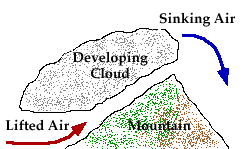When air is confronted by mountains, it cannot simply go through them, As the air ascends the mountain, the air cools as it rises and if it cools to its saturation point, the water vapor condenses and a cloud forms.

These clouds are called
orographic clouds,
which develop in response to the lifting
forced by the topography
the earth.
The exact type of cloud that develops depends upon the air's
moisture content and stability.
|